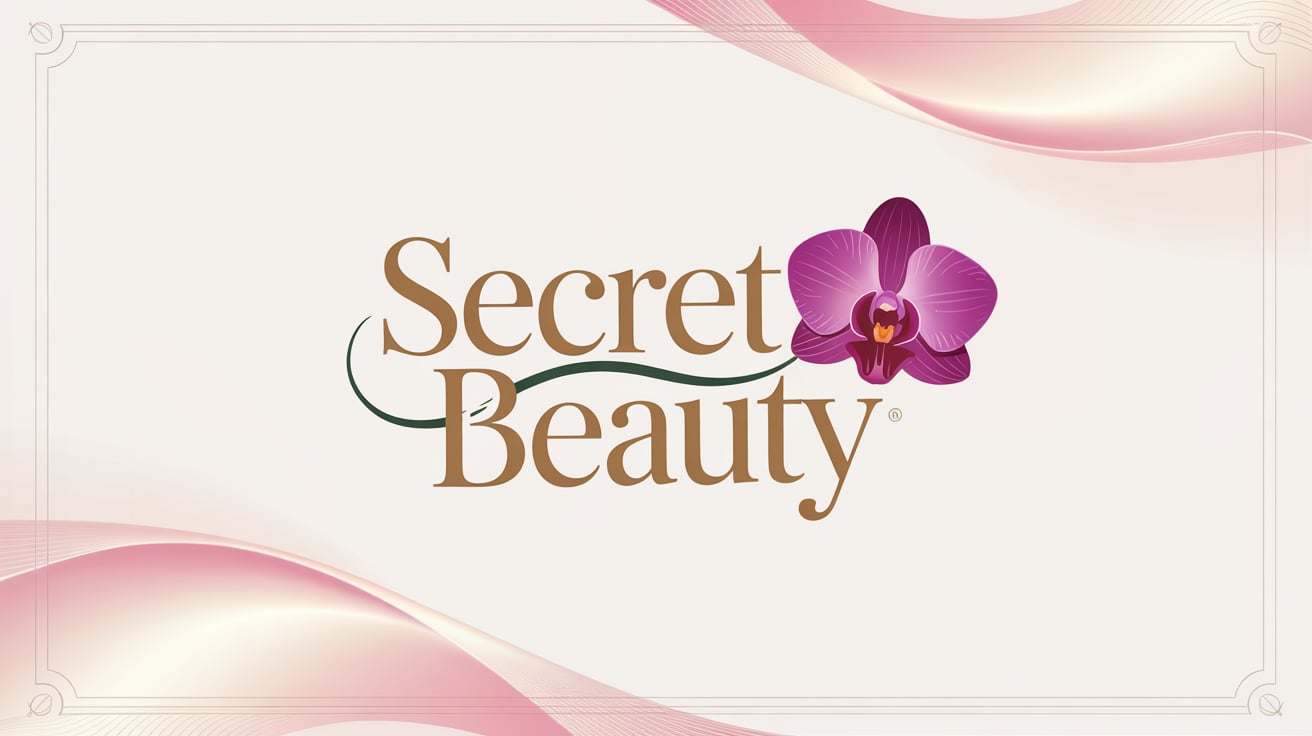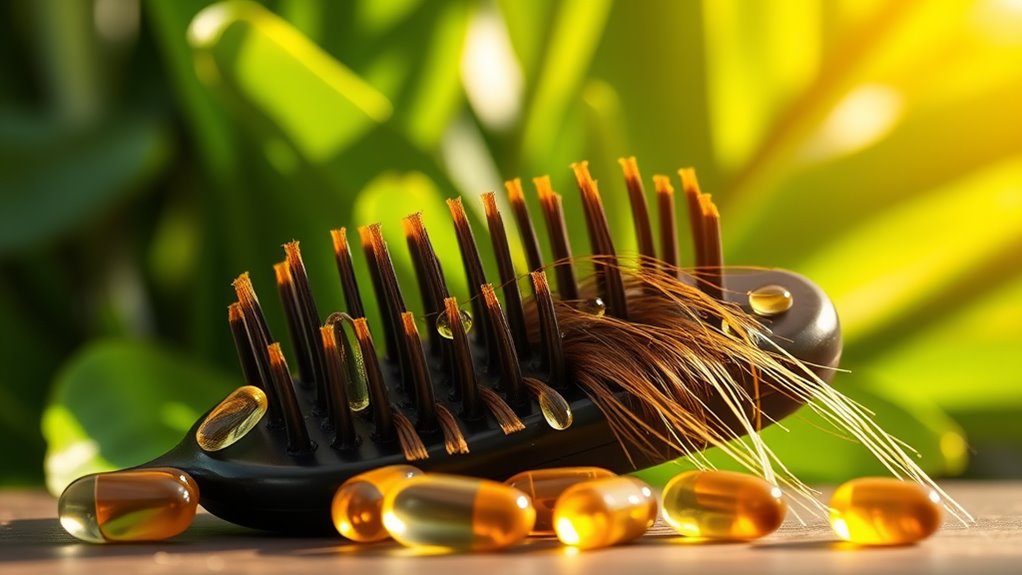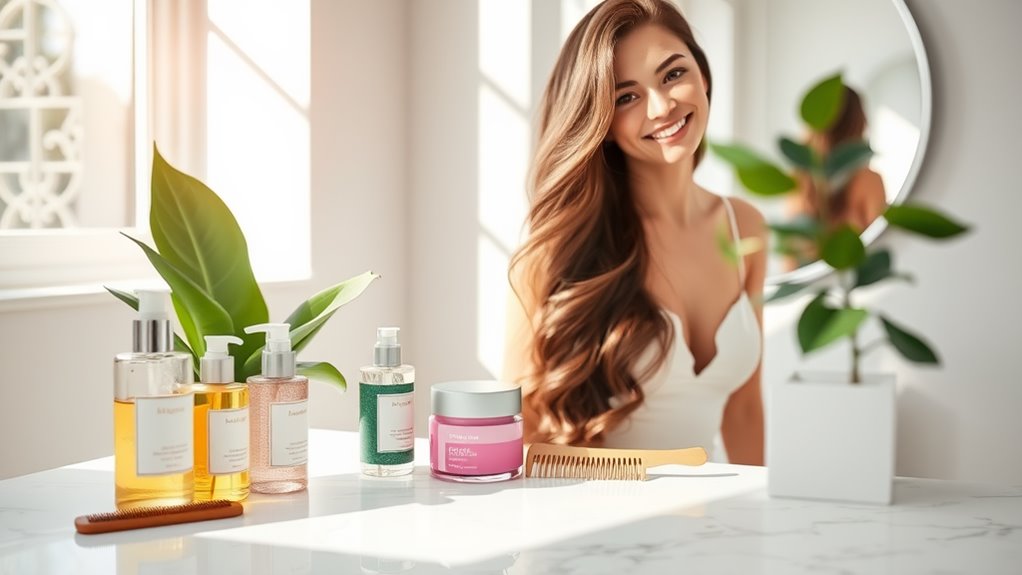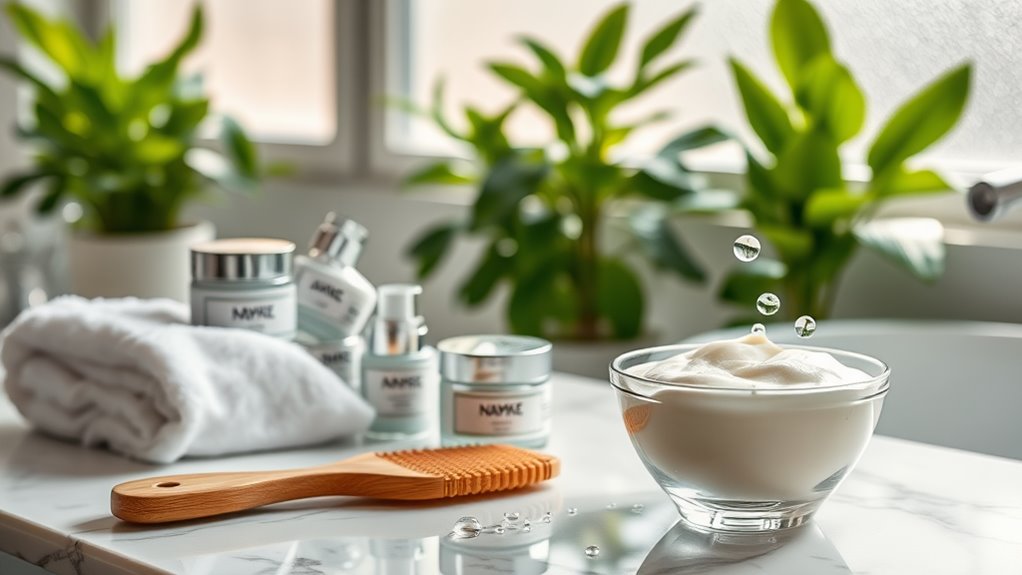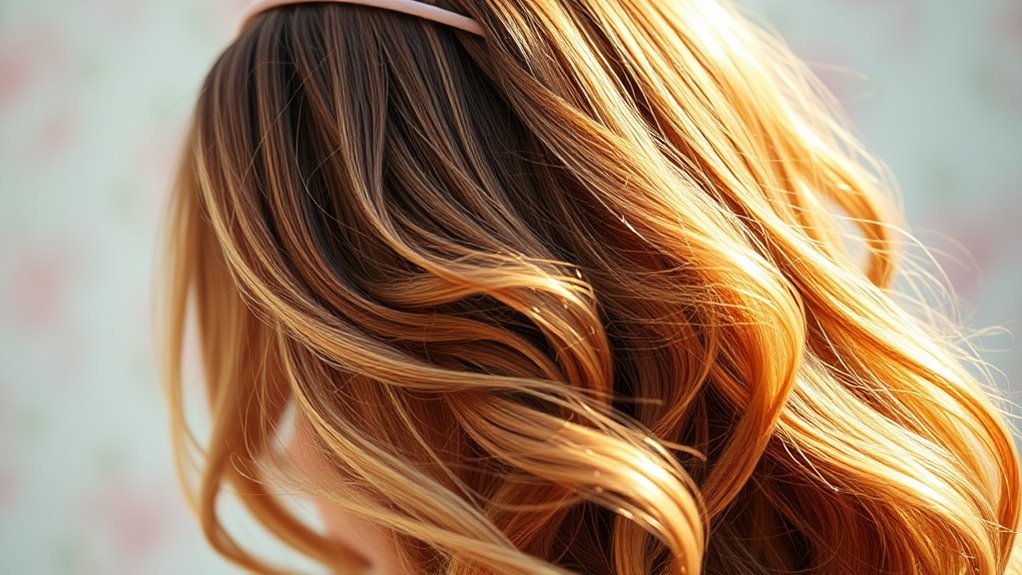What Your Hair Is Missing: The Vitamins You Need
Your hair’s importance hinges on key vitamins and minerals. Biotin strengthens strands and boosts growth, while vitamin D promotes follicle health. Iron helps transport oxygen to hair follicles, preventing thinning. Omega-3 fatty acids nourish your scalp, and vitamin E acts as a powerful antioxidant, protecting against damage. Don’t forget zinc and vitamin A, which support hair structure and scalp health. Want to uncover how to best incorporate these nutrients into your routine? There’s more to discover.
Key Takeaways
- Biotin is essential for hair strength and resilience, supporting protein synthesis and found in eggs, nuts, and leafy greens.
- Vitamin D regulates hair growth cycles and is crucial for follicle health; sunlight and fatty fish are natural sources.
- Iron is vital for oxygen transport to hair follicles, with deficiencies leading to thinning; include spinach, lentils, and red meat in your diet.
- Omega-3 Fatty Acids promote scalp health and reduce inflammation, enhancing blood circulation and maintaining hair hydration; sources include salmon and flaxseeds.
- Vitamin E acts as an antioxidant, improving moisture retention and blood circulation, found in almonds, spinach, and avocados for healthier hair.
Biotin: The Hair Growth Hero
When it comes to promoting hair growth, biotin stands out as a key player. This essential B-vitamin, also known as vitamin H, plays a critical role in converting nutrients into energy, fueling your hair follicles.
By incorporating biotin-rich hair vitamins into your routine, you’ll enhance your hair’s strength and resilience. You’ll find biotin in foods like eggs, nuts, and leafy greens, but supplementation can provide that extra boost. Additionally, biotin supports protein synthesis, which is crucial for maintaining healthy hair structure.
Aim for a daily intake that aligns with your individual needs, as too much can lead to unwanted side effects. Mastering your hair growth journey means understanding biotin’s power.
Embrace this hair growth hero, and watch as your locks transform into the healthy, vibrant mane you’ve always desired.
Vitamin D: Sunlight for Your Strands
Vitamin D plays an important role in maintaining healthy hair, and you can boost your levels by soaking up some sunlight.
It’s not just about sunbathing, though; you can also find Vitamin D in foods like fatty fish and fortified products.
Let’s explore how this essential vitamin can benefit your hair and where to get it naturally.
Role of Vitamin D
How can something as simple as sunlight boost your hair’s health? Vitamin D plays an essential role in this process. When your skin absorbs sunlight, it synthesizes vitamin D, which can enhance hair follicle growth and strength.
This vitamin helps regulate the hair growth cycle, promoting the shift from the resting phase to the growth phase. Without adequate vitamin D, you might experience hair thinning or loss, as your follicles struggle to thrive.
Incorporating vitamin D into your routine can also support overall scalp health, creating an ideal environment for hair to flourish.
Natural Sources Available
Sunlight isn’t just good for your mood; it’s also a fantastic source of vitamin D for your hair. Regular exposure to sunlight helps your body synthesize this essential vitamin, promoting healthier hair growth and reducing hair loss. Aim for about 15-30 minutes of sun exposure a few times a week, depending on your skin type.
Here are some natural sources of vitamin D:
| Source | Vitamin D Content (IU) |
|---|---|
| Fatty Fish (Salmon) | 570 |
| Cod Liver Oil | 1,360 |
| Fortified Milk | 120 |
| Egg Yolks | 37 |
Incorporating these sources into your diet alongside sunlight can maximize your hair’s health and well-being.
Iron: The Essential Mineral for Healthy Hair
Although many people focus on vitamins for hair health, iron is equally essential for maintaining luscious locks. This important mineral plays a pivotal role in oxygen transport to your hair follicles, ensuring they receive the nutrients needed for growth and vitality.
Without adequate iron, you might experience hair thinning or excessive shedding. Incorporating iron-rich foods like spinach, lentils, and red meat into your diet can greatly enhance your hair’s health. Research indicates that iron deficiency can lead to increased hair loss, making it crucial to monitor your levels.
If you’re vegan or vegetarian, consider pairing plant-based iron sources with vitamin C to boost absorption. Additionally, remember that too much iron can be harmful, so aim for balanced intake.
Omega-3 Fatty Acids: Nourishment From Within
While you may focus on vitamins for hair health, Omega-3 fatty acids are just as crucial for nourishing your locks from within.
These healthy fats, found in fish like salmon, walnuts, and flaxseeds, promote scalp health by reducing inflammation and enhancing blood circulation. When your scalp thrives, so do your hair follicles, leading to stronger, shinier hair.
Omega-3s also help keep your hair hydrated, preventing dryness and brittleness. Incorporating these fatty acids into your diet can improve hair density and overall well-being. Additionally, they provide essential nutrient-rich foods that can further support hair vitality.
If you’re aiming for luscious locks, consider adding Omega-3 supplements or food sources to your routine. Remember, true hair nourishment starts with a well-rounded approach that includes these essential nutrients for best results.
Vitamin E: The Antioxidant Powerhouse
Vitamin E is essential for maintaining healthy hair, as it acts as a powerful antioxidant that protects your strands from oxidative stress and damage. By neutralizing free radicals, it helps prevent premature aging of your hair follicles.
This vitamin also promotes better blood circulation in your scalp, which means your hair receives the nutrients it needs to thrive. Incorporating Vitamin E into your regimen can enhance moisture retention, leading to softer, shinier hair. Additionally, studies suggest that vitamins like biotin can work synergistically with Vitamin E to further support hair health.
You can find it in foods like almonds, spinach, and avocados, or through topical applications like oils and serums. For best results, consider combining Vitamin E with other hair-loving nutrients, creating a synergistic effect that elevates your hair care routine to new heights.
Zinc: Supporting Hair Structure and Function
Zinc plays an essential role in maintaining the structure and function of your hair, ensuring it remains strong and healthy. This significant mineral contributes to protein synthesis, which is fundamental for producing keratin, the primary structural component of hair.
A deficiency in zinc can lead to hair thinning and loss, as it disrupts the hair growth cycle. By supporting cellular repair and regeneration, zinc helps combat oxidative stress, promoting a more resilient hair shaft.
Incorporating zinc-rich foods like nuts, seeds, and whole grains into your diet can enhance your hair’s health. Consider supplements if necessary, but consult with a healthcare professional first.
Prioritizing zinc will empower you to maintain ideal hair health and structure, reflecting your overall well-being.
Vitamin A: Promoting Scalp Health and Hair Growth
Vitamin A plays a vital role in nourishing your scalp, which is essential for healthy hair growth.
By incorporating retinoids into your routine, you can stimulate cell turnover and promote a thriving environment for your hair.
Understanding how this vitamin impacts your scalp can help you achieve luscious locks.
Scalp Nourishment Importance
A healthy scalp is essential for vibrant hair growth, and one key player in this process is Vitamin A. This vitamin not only encourages the production of sebum, which moisturizes your scalp, but also helps to maintain cell turnover.
When your scalp’s cells regenerate properly, it creates a thriving environment for hair follicles to flourish. Without adequate nourishment, you risk dryness, flakiness, and potential hair loss.
Incorporating Vitamin A-rich foods like sweet potatoes, carrots, and spinach into your diet can greatly enhance your scalp health. Additionally, topical applications of Vitamin A can directly benefit your scalp, rejuvenating it and promoting ideal hair growth.
Prioritizing scalp nourishment guarantees that your hair has the best foundation to grow strong and healthy.
Retinoids and Hair Growth
While many factors influence hair growth, retinoids—derived from Vitamin A—play an essential role in enhancing follicle health. They stimulate cell turnover, helping to unclog hair follicles and promote a healthier scalp environment.
When you incorporate retinoids into your hair care routine, you’re not just nourishing your hair; you’re also creating ideal conditions for growth. This potent vitamin encourages collagen production, which strengthens hair strands and improves elasticity.
Additionally, retinoids reduce inflammation, a common barrier to healthy hair growth. To maximize these benefits, consider serums or topical treatments containing retinoids.
Frequently Asked Questions
Can I Get These Vitamins From Food Sources Alone?
Yes, you can definitely get these vitamins from food sources alone. Focus on a balanced diet rich in fruits, vegetables, nuts, and whole grains to guarantee you’re meeting your nutritional needs for ideal health.
How Long Does It Take to See Results From These Vitamins?
You’ll typically see results from vitamins within 8 to 12 weeks. Consistency is key, so keep taking them daily, and you’ll notice improvements in your hair’s strength, shine, and overall health over time.
Are There Any Side Effects of Taking These Vitamins?
When considering vitamins, some side effects can occur, like digestive issues or allergic reactions. It’s crucial you consult a healthcare professional before starting any regimen to guarantee it aligns with your health needs and goals.
Can I Take Vitamin Supplements With My Current Medications?
Before taking vitamin supplements with your medications, check with your healthcare provider. They’ll assess potential interactions and guarantee your regimen supports your health goals without causing adverse effects. It’s always better to be cautious.
How Do I Know if I’m Deficient in These Vitamins?
You can identify vitamin deficiencies through symptoms like fatigue, brittle nails, or mood changes. A blood test can provide accurate results, so consult your doctor for personalized advice and to discuss potential supplementation options.
